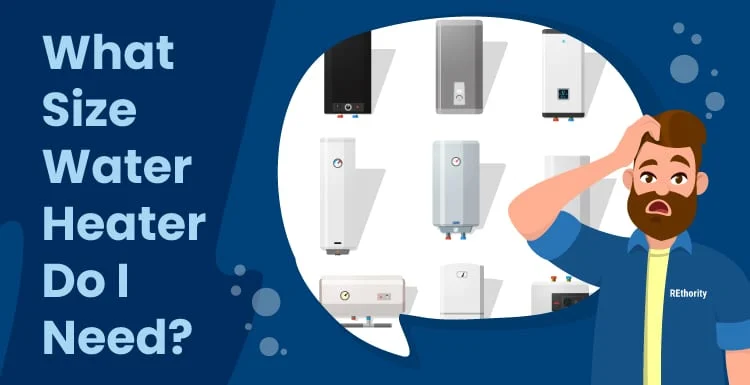“What size water heater do I need?”
We hear this question all the time. But don’t worry; you’re in the right place.
Our guide shows you whether you need a 30, 40, 50, or even 80-gallon water heater.
Wondering What Size Water Heater You Need?
If you’ll be shopping for a new water heater soon, buying the right size is important. A water heater that is too small runs out of hot water too soon.
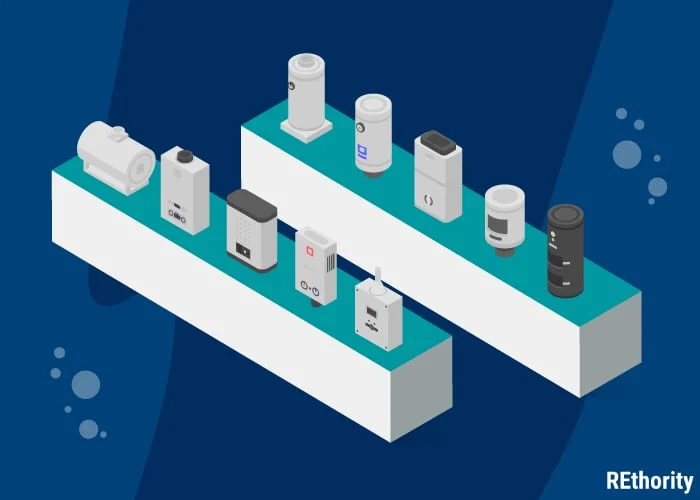
A water heater that is too big gives you more than enough hot water but wastes energy and results in sky-high utility bills.
Did you know that your water heater is responsible for about 20% of your energy costs?
Like Goldilocks and the Three Bears, when it comes to buying a new water heater, you want to buy the size that is just right.
As it turns out, there are a few industry shortcuts you can use to calculate your water usage and find the perfect water heater size for your household.
The water heater size you need is based on a few important factors:
- The number of people living in your home
- The level of hot water demand in your household
- The type of water heater you’re using (gas vs. electric or tankless)
We’ve checked with top water heater manufacturers and plumbing companies to get accurate estimates for choosing a water heater size based on these factors.
Keep reading to find out what size water heater you need to hit the sweet spot: plenty of hot water while keeping energy costs down.
What Size Water Heater Do I Need?
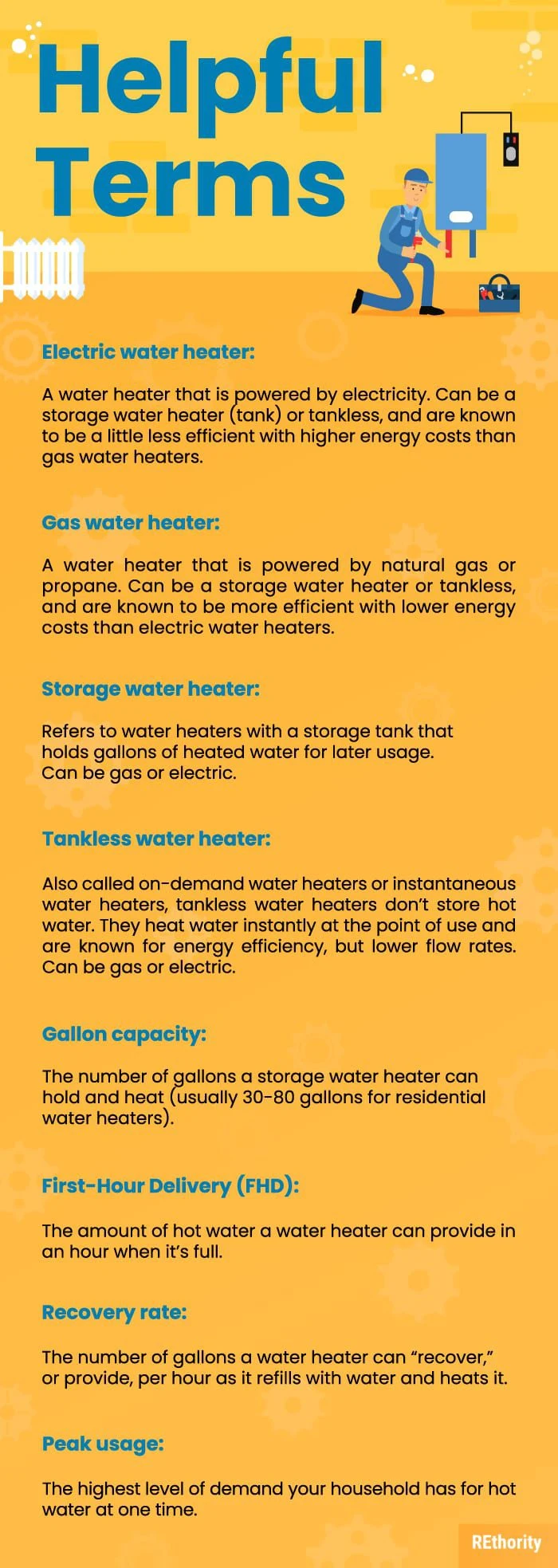
Determining what size water heater you need is easy. You’ll need to consider your household size, your household’s hot water usage level, and the type of water heater you’re using.
It’s helpful to learn a little water heater terminology to fully understand the size you need. Keep an eye out for these terms in our guide:
- Electric water heater: a water heater that is powered by electricity. Can be a storage water heater (tank) or tankless, and are known to be a little less efficient with higher energy costs than gas water heaters.
- Gas water heater: a water heater that is powered by natural gas or propane. Can be a storage water heater or tankless, and are known to be more efficient with lower energy costs than electric water heaters.
- Storage water heater: refers to water heaters with a storage tank that holds gallons of heated water for later usage. Can be gas or electric.
- Tankless water heaters, also called on-demand water heaters or instantaneous water heaters, don’t store hot water. They heat water instantly at the point of use and are known for their energy efficiency but lower flow rates. Can be gas or electric.
- Gallon capacity: The number of gallons a storage water heater can hold and heat (usually 30-80 gallons for residential water heaters).
- First-Hour Delivery (FHD): The amount of hot water a water heater can provide in an hour when it’s full.
- Recovery rate: the number of gallons a water heater can “recover,” or provide, per hour as it refills with water and heats it.
- Peak usage: the highest level of demand your household has for hot water at one time.
Now, let’s look at those factors that determine the size of water heater you need for your household.
Household Size

The first thing to consider when choosing the right size water heater for your household is the number of people living in it.
How many people regularly use hot water in your home?
If you live alone or with one other person, you won’t need a big water heater.
If you have a family of five or more, you’ll need one of the larger residential water heaters to ensure there’s enough hot water for everyone during peak usage.
If you regularly entertain or have overnight guests, you may have increased hot water needs as well, so keep this in mind.
In our chart below, you’ll see family size in the first column. Choose your family size to get an idea of what size water heater you need.
Hot Water Demand
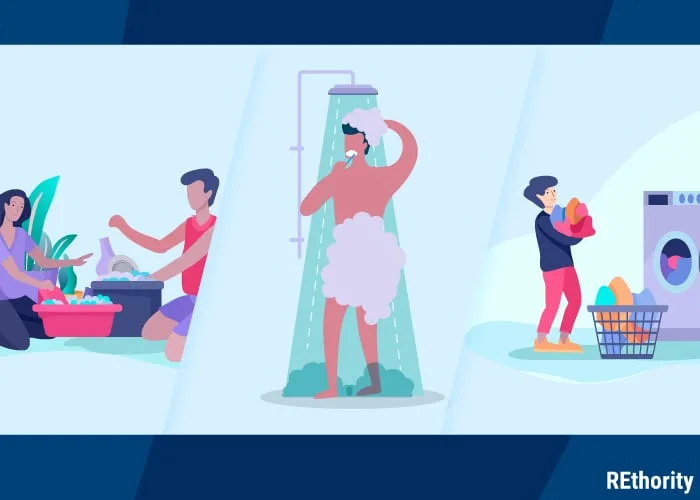
You should consider the number of people in your household and the level of hot water demand your household has.
Would you say your hot water demand is regular, low, or high?
Suppose everyone takes quick showers, washes dishes by hand, uses cold water for laundry, etc.
In that case, you won’t need as much hot water as a household where everyone takes hour-long hot showers, uses a dishwasher, and washes clothes in hot or warm water.
Your household’s hot water demand makes the recovery rate of your water heater important to consider.
The manufacturer provides this information in gallons per hour. Say you have a 50-gallon water heater (it keeps 50 gallons of water hot and ready for use).
Once you start using hot water (taking showers, using the dishwasher, washing clothes, etc.), the level of water in the tank goes down and refills with cold water that must be heated by the electric heating elements or the gas burner.
The recovery rate shows you how much water your water heater can reheat and supply you with after the pre-heated water in the tank has been used up.
It shows you how well your water heater can respond to your household’s demand for hot water. A high recovery rate can make a smaller water heater appropriate for a larger family to use.
In our chart below, you’ll see that there are two demand levels for each family size. Choose the one that corresponds to your household’s hot water demand to get a better estimate of the size of water heater you need.
Water Heater Type
Finally, the type of water heater you will be using factors into the size you need. Even though electric and gas water heaters come in the same gallon capacities, they differ quite a bit in their First-Hour Delivery (FHD) rates.
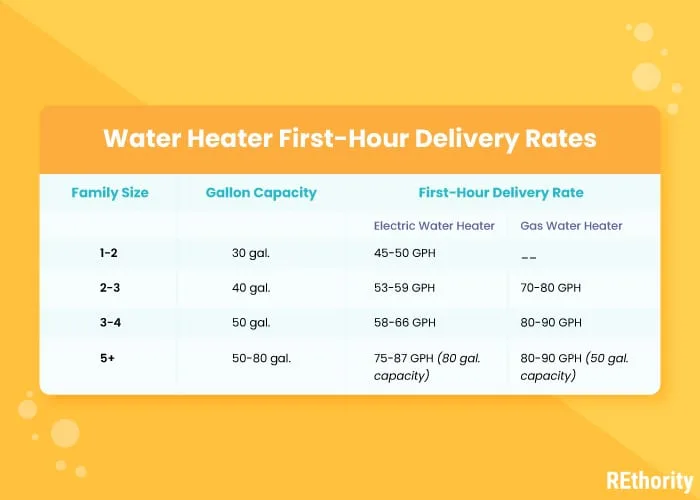
If you compare a 50-gallon electric and a 50-gallon gas storage water heater side by side, a 4500-watt electric water heater will deliver 58 to 66 gallons of hot water in the first hour.
A 30,000 BTU gas water heater will deliver 80 to 90 gallons of hot water in the first hour. Considering that the average shower uses about 17 gallons of water, that’s a big difference.
What does this difference between electric and gas water heaters mean for you?
If you’re going with an electric water heater, you might need a bit more capacity than you would with a gas water heater.
In the chart below, you’ll see that a family of 4 with high hot water demand can use a 50-gallon gas water heater but would need an 80-gallon electric water heater to cover the same usage level.
Consider the type of water heater you will be using to get the most accurate gallon size estimate.
Water Heater Size Chart
Check the chart below to see what size water heater you need. Start with household size, then choose your average level of demand.
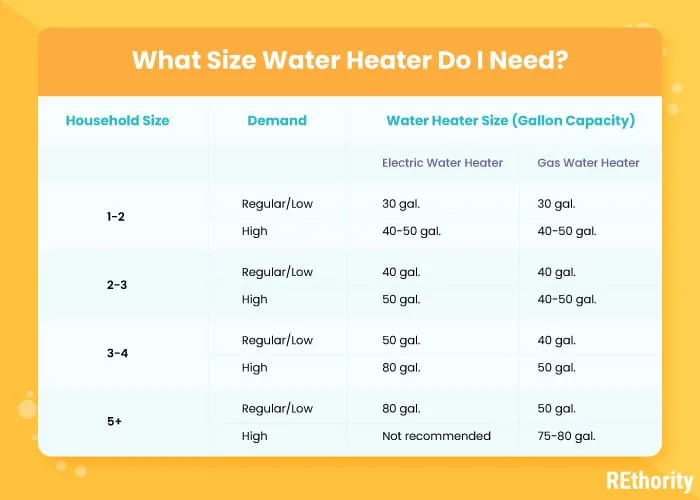
Finally, look in the correct column (electric or gas water heater) to see what size, or gallon capacity, will be the right choice for your family.
Let’s look at a few examples from the chart to see how family size and demand affect water heater size needs.
Janna lives alone and loves taking long, hot showers before bed. She hosts many gatherings and has a few friends that come every couple of months to stay for a week or so.
She uses a dishwasher and washes her clothes in hot water. She generally has a high level of hot water usage. Janna probably needs a 40 or 50-gallon water heater to keep up with her hot water demand.
Chris, Robin, and their twin sons are a busy family always on the go. Everyone takes quick showers first thing in the morning and rushes out the door to school and work.
They eat most meals away from home and have a few dishes to wash each day. They always use cold water for laundry and hand-wash the dishes.
They generally have a low to regular hot water usage level. Chris, Robin, and the boys probably need a 40-gallon gas water heater or a 50-gallon electric water heater to supply their hot water needs.
A group of four roommates shares a house. Some of their friends and family come to sleep over on occasion. Everyone takes a 10–20 minute hot shower each day.
Everyone washes clothes separately, and some use hot water for their loads of laundry. They use the dishwasher frequently because they eat most of their meals at home.
They generally have a high hot water usage level. The roommates probably need an 80-gallon gas water heater to supply their hot water needs, especially with overnight guests coming over and using the hot water regularly, too.
What Size Tankless Water Heater Do I Need?
Tankless water heaters are a bit different in terms of size. Since they don’t have physical storage tanks, we don’t label tankless water heaters by capacity. Instead, we label them by flow rate.
The flow rate of a tankless water heater tells how much hot water (in gallons per minute) can be provided at a given time and temperature rise (how many degrees the tankless water heater has to heat the water).
Let’s say you start off with cold water that is 50 degrees Fahrenheit. You have a tankless water heater with a flow rate of 4 gallons per minute at a 70-degree temperature rise (to heat the water from 50 degrees to 120 degrees).
Look at the chart below. Since a shower head’s flow rate is about 2 GPM and a dishwasher’s flow rate is about 2.5 GPM, this tankless water heater’s 4 GPM flow rate couldn’t support someone taking a shower while the dishwasher was running.
Although the hot water wouldn’t run out the way it can when using a tank-style water heater, the flow will drop considerably because the water heater’s burners can’t keep up with that level of demand.
Now, if you had a tankless water heater with a flow rate of 8 GPM in this example, you could shower, use the dishwasher, and wash a load of clothes at the same time without affecting the flow rate.
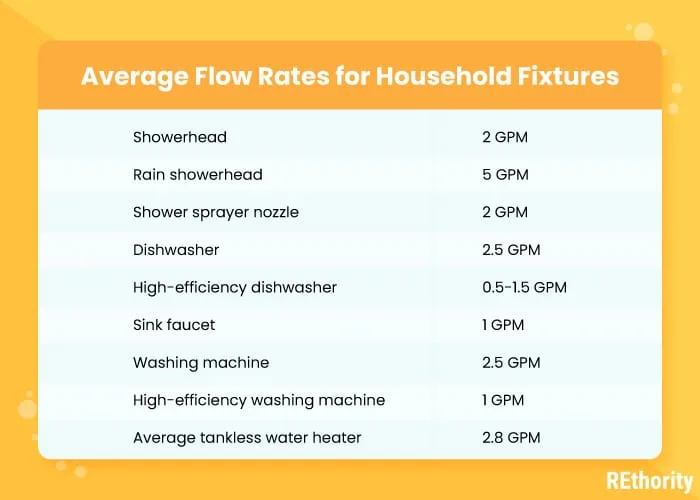
To choose the right tankless water heater size for your household, look for one with an adequate flow rate based on your usual hot water usage.
Calculate the flow rate for your peak usage, or the heaviest amount of water you expect to use at one time.
For example, a shower, sink faucet, dishwasher, and washing machine being used at once would equal a total flow rate of 8 GPM.
This means you’d need to look for a tankless water heater that has a flow rate of at least 8 GPM, regardless of the number of people in your household.
On a related note, be sure to check out our top recommendations for the best tankless water heaters.
Water Heater Size Is Important
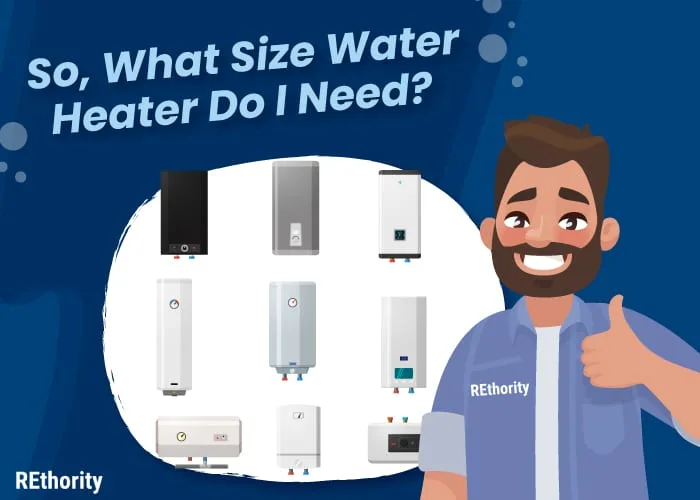
It’s a good thing to pay close attention to the size of water heater you need. Buying a water heater that is the correct size will help you keep your energy bills low while ensuring you have plenty of hot water for every household member’s use.
Keeping your household size, hot water demand, and water heater type in mind is essential for finding the right storage water heater. Our chart above will help you determine the size of water heater you need based on these factors.
Determining your peak usage flow rate will help you determine the right size tankless water heater. Remember that tankless water heaters aren’t sized the same way as storage water heaters.
Use the flow rate and temperature rise of a tankless water heater to see if it will be enough for your household.
Most households need a tankless water heater with a flow rate of at least 4 GPM, but some may need ten or more GPM.
By choosing the right size water heater, you’ll make the most of this essential investment and ensure everyone has hot water available when they need it.

